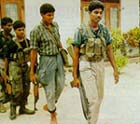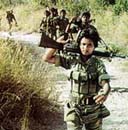The Rediff Special/Colonel John Taylor (retired)
'The army commanders had no say in the IPKF operation. Wars are not fought this way'
 The Jain Commission report has once again stoked an angry controversy over the Indian government's assistance to the Liberation Tigers of Tamil Eelam, and the eventual deployment of the Indian Peace Keeping Force in Jaffna.
The Jain Commission report has once again stoked an angry controversy over the Indian government's assistance to the Liberation Tigers of Tamil Eelam, and the eventual deployment of the Indian Peace Keeping Force in Jaffna.
In this fascinating account, Colonel John Taylor (retired), who took part in the IPKF mission, reveals how the Indian army was let down by the political leadership in Delhi.
The leak in the Jain Commission interim report and
the tabling of the report in Parliament has rocked the nation
and was explosive enough to topple the United Front
government from its shaky pedestal.
The Jain Commission was meant to establish the causes leading
to the assassination of Rajiv Gandhi, the prime minister at
the time of the IPKF operation in Sri Lanka; and examine the
conspiracy angle.
The conspiracy question remain emotive and politically explosive.
That the LTTE was responsible for the assassination of Rajiv
Gandhi has been proved beyond doubt. Why did they do it? The IPKF
operations in Sri Lanka had a major role in influencing this decision.
The Ethnic Background
The Tamils went to Sri Lanka a few
centuries ago as labourers for the rubber plantations and later
for the tea gardens. Over the years they established themselves
as hard working industrious workers who could be trusted with
more than just hard menial labour. Their drive, dedication and
intelligence made them the preferred lot. They soon shifted from
being a labour force to becoming the lower middle class and the
middle class. White collar jobs started being dominated by
them.
 By the time Sri Lanka became independent the north and eastern
parts of Sri Lanka was fully inhabited by the Tamils, who started
settling there in large numbers. They dominated these areas by
their physical presence. Full villages were Tamils. The circle
was complete -- Tamils in certain regions and Sri Lankans in others.
With independence came Sri Lankan chauvinism -- language and
opportunity. Why must all the jobs go to the Tamils?
Why must the Tamils not speak Sinhala? Why not send them all back
to India?
By the time Sri Lanka became independent the north and eastern
parts of Sri Lanka was fully inhabited by the Tamils, who started
settling there in large numbers. They dominated these areas by
their physical presence. Full villages were Tamils. The circle
was complete -- Tamils in certain regions and Sri Lankans in others.
With independence came Sri Lankan chauvinism -- language and
opportunity. Why must all the jobs go to the Tamils?
Why must the Tamils not speak Sinhala? Why not send them all back
to India?
The emotional and physical pressure on the Tamils increased
day by day. Irrespective of talks as early as 1953 between Pandit
Jawaharlal Nehru and Mr Bandaranaike and subsequent talks by Lal Bahadur Shastri and Indira Gandhi, nothing substantial happened.
The Tamils continued to be second class citizens.
The Tamils became restless. They took up arms after years
of negotiations to reach political and peaceful settlements failed.
The LTTE emerged as the strongest militant group. They did not
hesitate to wipe out any opposition, Tamil or Sri Lankan. The Tamils
began to be 'heard' through the gun. The LTTE was glorified
by all strata of Tamils -- the intellectuals, the white collar
worker, the labourer. They had mass appeal.
Events Leading to the Induction of the IPKF
With the LTTE
growing stronger and stronger every day, they soon began to totally
control northern and eastern Sri Lanka. They collected taxes,
controlled the entry of goods to the Jaffna peninsula by controlling
the strategic Elephant Pass. Banks, the postal department, railways --
everything was controlled by the LTTE. The traders paid for protection,
so did the farmer. Not a single ethnic Sri Lankan could live in
the area controlled by the militants. There were also other militant
groups like the ENDLF, EPRLF, EROS and a few others. They had no
mass appeal and controlled a few areas. They were totally
wiped out (except for the leaders) by the LTTE by 1987.
The Sri Lankan government was fed up and at its wits end. They
decided to send in the army. The first full-scale military action
of ground troops, supported by tanks and armed helicopters, was
taken in the Jaffna peninsula in 1987. The Sri Lankan Tamils
were driven out of their villages by a trigger-happy Sri Lankan
army who literally bulldozed their way forward. Bulldozers were
used to erase the villages and the troops hiding behind the bulldozers
fired at any thing that moved.
 The air force
and armed helicopters help bombard the villages and gave aerial
support. Soon the Tamils were crying genocide. The
LTTE, who were basically a militant group, could not cope with
a full-fledged conventional military attack.
The air force
and armed helicopters help bombard the villages and gave aerial
support. Soon the Tamils were crying genocide. The
LTTE, who were basically a militant group, could not cope with
a full-fledged conventional military attack.
The Indian government sent an Indian Air Force plane to drop food
and rations, as a symbolic gesture of support to the Sri Lankan
Tamils. The Sri Lankan government led by J R Jayewardane accused India
of interference in its internal affairs. The Rajiv Gandhi government
said it would continue to support the Sri Lankan Tamils on humanitarian
grounds and urged the Jayewardane government to hold a dialogue with
the Sri Lankan Tamils.
'The Jain Commission report sheds a lot of new light on what the IPKF was up
against, both at home and in Sri Lanka'
Tell us what you think of this feature
|

